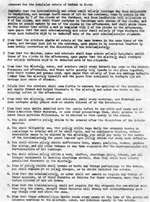
|
Transcript of Dedham Grammar School Statutes, 1579 STATUTES OF DEDHAM GRAMMAR SCHOOL Articles...5. Item that none be eligible to be schoolmaster of the said free grammar school except he be a Master of Arts proceeded in one of the universities of Cambridge or Oxford of a year standing at the least Provided always that the schoolmaster so eligible shall have sufficient knowledge in the Greek tongue to teach as well the said scholars the principles thereof, as of the Latin tongue.
The Free Grammar School at Dedham was endowed by William Littlebury, Gentleman of Dedham, in July 1571 with a farm called Ragmarsh situated in the parishes of Bradfield and Wrabness then rented at £20 a year.73 This donation was confirmed and the Governors incorporated by Charter dated 14 May 1574 when the school was directed to be styled 'Queen Elizabeth's Free Grammar School'. Latin Grammar was the staple diet of the curriculum of such schools. The texts of the boys' (it was mainly boys who attended), were often un-bound 'grammars' as Lily's A Short Introduction of Grammar of 1548/9. However, the intention was to kill as many birds with one stone as possible. The Latin sentences upon which accidence, syntax, orthography, prosody and construing or parsing were practised had moral and religious messages. And when moving onto the speaking and writing of consecutive sentences, rhetoric was developed using phrases, proverbs and stories drawn from improving authors like Erasmus and Vives. Learning to be good people, whilst studying to be good at Latin, was the aim. 'Lettered piety' was the contemproary expression which encapsulated this. There has been a lively debate about the impact of the Reformation on such education. Earlier writers like A.F.Leach, as a Charity Commissioner steeped in the muniments, saw the Dissolution of the Monasteries and the removal of Chantries, (chapels and their accompanying priests which were dedicated to prayers for the souls of benefactors - with often sufficient time and interest in training up young boys), as an educational disaster. Monastic 'song schools' for noviciates and the monastic libraries ceased, while the chantry priests were turned out to other uses. But later authorities have pointed out the continuities, the number of chantries which were granted continuation warrants or the former monastic books which, though dispersed, surfaced in private hands. When local schools did not get a continuation warrant, local inhabitants often petitioned the crown for the school's re-foundation and were allowed to dedicate such schools to a royal patron. It seems natural that schooling should be viewed as important during the Reformation and Counter-Reformation. There was an element of a battle for hearts and minds, to ensure the correct blend of 'pious and Godly learning'. Schoolmasters were obliged to obtain a licence to teach which required subscription to the Act of Supremacy. Ecclesiastical machinery in the form of Archdeacons's Courts, the Consistory Courts, was used to enforce catechisms and sins of omission or commission. Not taking school-children to church, for example, was punishable. But it is the detail of life at school which catches our attention. How many days of the week was school open and required? What were the hours of attendance? How long was the mid-day break? What equipment had to be provided by the parents? What exercise is prescribed? Incidentally it was to Dedham Grammar School in a later age that John Constable made his schoolboy's way.
|
||||||||
 |
||||||||
